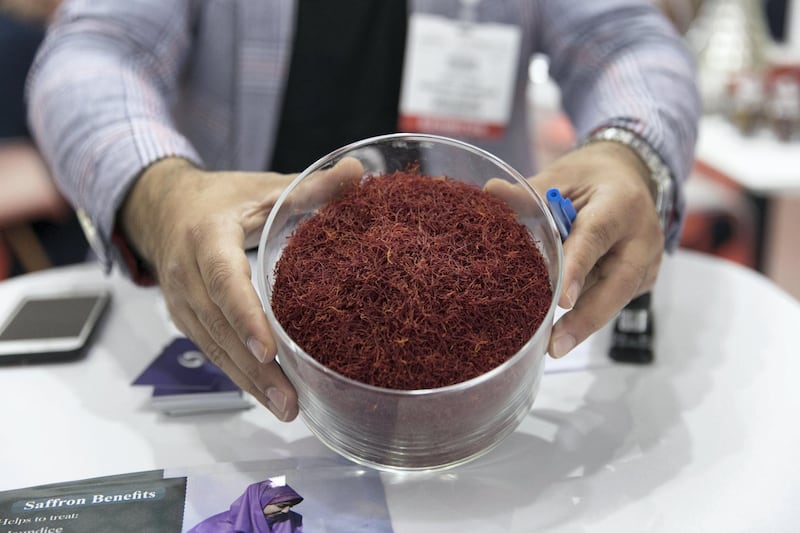Saffron has long been a favourite ingredient in Middle Eastern cooking, making dishes richer in colour and flavour.
Made from the saffron crocus that is cultivated in parts of the region, the spice is said to be one of the most expensive in the world by weight.
But far removed from its traditional culinary role, new research in the UAE has revealed the plant could have important cancer-beating properties.
Scientists at UAE University have announced results from a study using rats that suggests a saffron extract – an organic compound called safranal – could help destroy cancer cells.
“Safranal was stopping cancer from developing and killing the cancer cells,” said Ameera Al Mansoori, in reference to the study.
“It was so clear safranal had an effect,” she said, describing her results as “very pleasing”.
________________
Read more:
Shisha is the biggest smoking threat to health, NYU Abu Dhabi research finds
UAE hospital initiative aims to show there is life after cancer
Shisha is 'much worst for smokers than cigarettes'
________________
Ms Al Mansoori, a master's degree student at UAEU, helped conduct the research by first injecting carcinogens into live rats.
Using a needle that went down the throat of each animal into its stomach, she then fed a number of the rats safranal over several weeks.
Meanwhile, to create a control group, other rats injected with carcinogens were not given safranal.
The results found that cancers in the animals which were given the extract retreated, while the disease continued to survive in the second group.
Biochemical tests indicated that, in the cancer cells, safranal stopped the cell cycle – the means by which cells divide and multiply.
Instead it induced apoptosis, a term given to a natural process where the body initiates a tightly controlled process of cell death.
The findings could ultimately lead to safranal being tested for its effectiveness on humans, although any use of it as a treatment, were it to happen, would be unlikely in the near future.
“We need to do more tests,” said Ms Al Mansoori, an Emirati from Ras Al Khaimah. “We have other pathways that cancer relies on – we could test that to support my work.”
Ms Al Mansoori, 25, who completed her first degree at the American University of Ras Al Khaimah and who wants to eventually study for a PhD, is planning to write up her research for publication in a scientific journal.
The work will involve peer-review by other researchers and allow the findings to be considered more definitive.
Her biology and biotechnology master's degree project was completed under the supervision of Professor Amr Amin, a UAEU professor of biology.
In a separate study that has recently been published in the journal Scientific Reports, Prof Amin and a team of co-researchers have detailed a research project that indicated that safranal could kill human liver cancer cells.
Among the other scientists involved in this study was Dr Kourosh Salehi-Ashtiani, an associate professor of biology at New York University Abu Dhabi.
As with the study on rats, the liver cancer cell research was thought to show that safranal caused apoptosis.
“When normal cells see things are going bad, they go into this suicide mode where they kill themselves,” said Dr Salehi-Ashtiani.
“We see safranal inducing that. That's quite good if you're trying to get rid of cancer cells.”
The research on safranal at UAEU and NYU Abu Dhabi comes on top of other studies on the substance's anti-cancer properties.
A 2014 paper by scientists in Iran found that safranal inhibited the growth of, and induce death in, cancer cells, concluding that the saffron extract “appears to have potential as a therapeutic agent”.
Safranal joins a growing list of substances tested for anti-cancer effects by UAE scientists.
For example, research at UAEU has indicated that extracts of the tree Rhus coriaria, which grows in the Middle East, can kill colon cancer cells and breast cancer cells.
Other laboratory studies at UAEU have suggested that extracts of the herb marjoram (Origanum majorana), which is used as a food flavouring, are capable of killing breast cancer cells.
While the recent studies suggest that safranal could have uses against cancer, it typically takes a number of years before results in the laboratory can actually be applied in medicine.
Also, many substances that appear promising in a laboratory setting end up not being effective in combating illness in people.
In the meantime, Dr Salehi-Ashtiani warned against individuals eating saffron in the hope it might prevent or cure cancer.
“I don't recommend people just taking large quantities for the hope of helping them,” he said.
“It's something that requires careful clinical study, that needs to be done in the right way. I want to make sure there's no misconception.”






